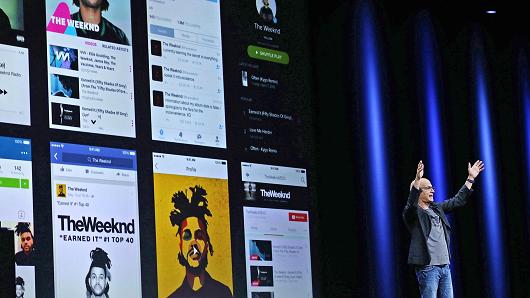Walling the Garden and Putting the App into Apple Music
Post by Tim Anderson, Old Dominion University
Let’s begin with Taylor Swift so we can get that out of the way: Swift stands tall, talented and influential. Her ability to call bullshit on not paying during a “promotional” period should stand as a reminder that the best weapon for a musician in the industry is knowledge. Historically, musicians have not received royalties when their music was being “promoted” through radio airplay and free copies. However, this promotion had nothing to do with Swift’s or any other artist’s latest release. The three-month promotional period is about promoting the Apple Music service. The latest streaming music service is an iteration of Beats, which was an iteration of MOG. As every Apple user knows, Apple does not invent technologies so much as refine them. In this case the five days I have been using the service has brought me to an odd conclusion: I am impressed, and am convinced that we have seen just the tip of what Apple Music can add to a counter-reformatory music industry of continually-concentrating publishers and labels.
I say this for two reasons. First, the June 8th presentation of the service at the annual WWDC was muddled and confused at best. Seeing Jimmy Iovine stumble and Eddy Cue dance awkwardly while they proclaimed another revolution simply felt forced, and now we know why. The service is hardly revolutionary. Instead, it is a very interesting and important entry into an already-existing streaming game. Even the new service of “Connect,” which purportedly connects artists with fans, feels like another version of Twitter or Instagram. Furthermore, Apple couldn’t even deliver the service on time and delayed new versions of iTunes for OS X several times throughout the day. These delays suggest that they were pushing to the very last moment to produce a product whose capabilities they have yet to truly conceive. In other words, expect changes, many of them, and expect them often as iTunes continues to mutate while Apple Music finds new ways to service its listeners.
Secondly, this is really about extending the iTunes application. This already-overloaded portal that delivers iOS updates, books, podcasts, movies, and more is Apple’s most important application. It most likely has your credit card and now it offers a very convenient and quality walled garden of a streaming service for a monthly fee. Indeed, the three-month promotion is Apple’s 90-day gift, allowing users to freely frolic in a garden of 256kps streams that seamlessly integrates in your iTunes. It will likely temper thousands of skeptical users into their service. And unlike Spotify, iTunes’ advantage is that it is the playback device that you’re most likely to use first when you play any music. By placing the streaming service in the iTunes app, Apple has, again, used its most important consumer-face application as the media-oriented Trojan Horse that it is.
As gifts go, the user in me doesn’t mind accepting this one. Although Apple consumes my data while it surveys every single stream and search I provide it, as a streaming service I find it a worthy successor to Beats and a competitor to Spotify. Please note: Spotify and the seemingly doomed Tidal offer comparable catalogues with better bitrates. However, the combination of convenience and the fact that I don’t stream through the most high-end equipment in the world means I will be using this service a lot more than I ever anticipated.
Truth is, until relatively recently, Apple had not anticipated offering such a service. Steve Jobs never believed that subscription models were viable when it came to music. Indeed, when Apple purchased the pay-per-stream music service Lala in 2009, it was rumored the streaming service was purchased primarily to acquire its engineers. Indeed, Apple quickly and quietly gobbled up the firm only after it had submitted a never-released iOS app to Apple’s App Store that practically turned an iPhone into a portable, cloud-based jukebox where users could license the infinite playback of any track for a dime. Impressed, Apple transformed the basis of Lala’s services into the form of Apple’s iTunes Match, a service that allows users to essentially store 25,000 songs in the cloud and stream them through an iOS device. Still, the acquisition of Beats Music pointed to something much, much bigger. Indeed, the 2014 $3 billion U.S. purchase of Beats happened in a new Apple, one that was almost three years beyond Jobs’ passing and willing to bet on becoming a competitor to the dominant music-only streaming service, Spotify.[1] Five days into using both services, my gut feeling is that Apple Music will be able to compete with Spotify. Furthermore, I suspect that the two will lead a new oligarchy of on-demand streaming services. As interesting as Tidal may be, its app and debut has stained it as a loser service that – along with Rdio, Deezer, and the all-but-forgotten streaming pioneer, Rhapsody – will be vying for a distant third place. These big two services, and little three to whomever, will be a very substantial portion of a near future of the industry that is based on data aggregation and mining rather than sales.
All of which makes me yearn for 2005. Ten years ago I penned a post for Flow noting that after multiple record chains shuttered and MySpace had emerged as an interesting distribution mechanism for artists, such as Annie and Clap Your Hands Say Yeah, that we had “a chance to, like punks in the late 1970s and hip hop of the early 1980s, once again see what it means to get really small together.” If anything, the fact that I find the debut of Apple Music a pleasant service makes me believe that this chance has, for the moment, passed. With Apple Music and Spotify the legal alternatives to piracy have emerged and have found supporters such as Taylor Swift and Led Zeppelin. And while The Beatles have yet to allow their catalogue to become “streamable,” one of the last classic rock holdouts, AC/DC, has relented and placed their music on both Spotify and Apple Music. As more and more legacy acts have relented to a ever-improving technical capacities and new business models, streaming services are now in a position to dominate. And at $14.99 a month for my family of five to legally access eight million plus records, Apple Music is providing a walled garden of goods that, although they could not have imagined to be successful, sounds great and has nothing revolutionary about it.
______________
[1] Technically, YouTube is the dominant music streaming service. Indeed, rumors have abounded for the last two years that the Google-owned service would debut its own service, somewhat independent of Google Play.




